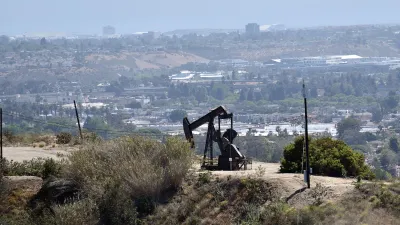On the heels of President Obama's Clean Power Plan rule that reduces carbon dioxide emissions from power plants, the new rule focuses on the other major greenhouse gas, methane, and rather than coal, it is focused on oil and gas drilling.
"The Environment Protection Agency is proposing a new rule that would reduce methane emissions from oil and natural-gas drilling by 40 to 45 percent of 2012 levels by 2025," writes Krishnadev Calamur, a senior editor at The Atlantic. "The rules, which would apply only to new and modified gas wells, were first outlined in January by the White House" (and posted here).
EPA's final Clean Power Plan rule, released earlier this month, addressed carbon dioxide emissions from power plants, particularly those that burned coal.
"Both (carbon dioxide and methane) contribute to global warming, but methane’s global-warming potential (the amount of heat trapped by a specific amount of mass) is more than 25 times greater than that of CO2, the EPA says," writes Calamur. "The oil and gas industry was responsible for about 30 percent of methane emissions in the U.S. in 2012.
The energy industry opposes the regulations. In fact, the oil industry seems the rule as part of the administration's "war on oil," notwithstanding President Obama's go-ahead on August 18 to Shell to begin drilling in the Arctic Ocean
In addition to methane, the new rules will reduce volatile organic compound (VOC) emissions, a major component of smog, from the new wells according to EPA's press release. While methane is a major component of natural gas, the rule will affect oil drilling, particularly where fracking is involved as the press release indicates:
EPA’s proposal would also require that industry reduce VOC and methane emissions from hydraulically fractured and refractured oil wells, which can contain significant amounts of natural gas along with oil
"In a conference call with reporters, Janet McCabe, the Environmental Protection Agency’s acting assistant administrator for the Office of Air and Radiation, said the rules were designed to ensure that oil and gas companies reduced waste and sold more gas that would otherwise be lost, while protecting the climate and the health of the public," write Gardiner Harris and Coral Davenport for The New York Times.
Continued reliance on dirty fossil fuels is a dangerous course for our communities and our climate. We must move swiftly to truly clean energy like wind, solar and energy efficiency while establishing policies that keep fossil fuels in the ground."
FULL STORY: The EPA's New Methane Rules for the Oil and Gas Industry

Maui's Vacation Rental Debate Turns Ugly
Verbal attacks, misinformation campaigns and fistfights plague a high-stakes debate to convert thousands of vacation rentals into long-term housing.

Planetizen Federal Action Tracker
A weekly monitor of how Trump’s orders and actions are impacting planners and planning in America.

San Francisco Suspends Traffic Calming Amidst Record Deaths
Citing “a challenging fiscal landscape,” the city will cease the program on the heels of 42 traffic deaths, including 24 pedestrians.

Adaptive Reuse Will Create Housing in a Suburban Texas Strip Mall
A developer is reimagining a strip mall property as a mixed-use complex with housing and retail.

Study: Anti-Homelessness Laws Don’t Work
Research shows that punitive measures that criminalized unhoused people don’t help reduce homelessness.

In U.S., Urban Gondolas Face Uphill Battle
Cities in Latin America and Europe have embraced aerial transitways — AKA gondolas — as sustainable, convenient urban transport, especially in tricky geographies. American cities have yet to catch up.
Urban Design for Planners 1: Software Tools
This six-course series explores essential urban design concepts using open source software and equips planners with the tools they need to participate fully in the urban design process.
Planning for Universal Design
Learn the tools for implementing Universal Design in planning regulations.
Heyer Gruel & Associates PA
JM Goldson LLC
Custer County Colorado
City of Camden Redevelopment Agency
City of Astoria
Transportation Research & Education Center (TREC) at Portland State University
Jefferson Parish Government
Camden Redevelopment Agency
City of Claremont



























